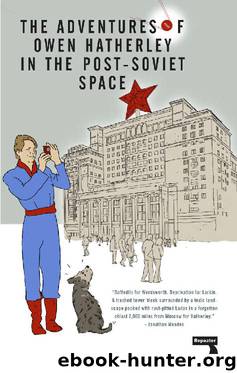The Adventures of Owen Hatherley In The Post-Soviet Space by Owen Hatherley

Author:Owen Hatherley [Hatherley, Owen]
Language: eng
Format: epub
Publisher: Repeater
Published: 2018-11-14T21:00:00+00:00
Children’s story
Teaching Minskness
The format of the Architectural Forum is that four groups of students work on a project on a chosen theme, which in 2017 was defining Minskness, and its expression in the city’s many, often large and formal, public squares. I wasn’t expecting the scene when I arrived at the forum’s venue: the Zair Azgur Museum, dedicated to a mediocre Stalinist-era sculptor. On steel shelves reaching all up to the ceiling of a triple-height space, in a tiny redbrick building in a housing estate, are dozens of busts and statues of notables, writers, revolutionaries and dictators. Mao, Churchill, Thomas Mann, Immanuel Kant, Khrushchev, Kim il Sung, Stalin, and around twenty different Lenins. Usually the place is open to the public, but presumably interest in it is so low that some architecture students could take it over for two weeks without anyone asking to see their favourite bust of Taras Shevchenko. It was an ingenious place to choose for the students – most of whom have lived all their lives under Alyaksandr Lukashenka – to confront the question of Minskness. The way in which they sat around casually when surrounded with this (literal) overpowering weight of authoritarianism was striking – they didn’t look like they were constantly oppressed by the legacies of totalitarianism. They looked like they thought it was funny, which, given it includes, for instance, a statue of Felix Dzerzhinsky cradling a small child, it is, in its dark way.
The forum happened to coincide with the anniversary of the beginning of the Russian Revolution. In March 1917, women’s day protests spiralled into a strike wave that brought down the Tsar. Minsk’s response? A poster campaign celebrating “100 Years of the Belarusian Police”. Downplaying the revolution, even given that this revolution founded the Soviet state that is venerated here, was not so strange, given that a protest wave – against a tax on the unemployed, given that full employment here is finally collapsing under the weight of the financial crisis – was spreading, quietly, around the country; many analysts were surprised that it wasn’t the usual suspects anymore, the nationalists and liberals who turn up to get arrested every independence day, but people who had never been on protests before. The public squares that are so well suited to protest, so open and available, yet so obviously a showcase of power and planning, that the students were supposed to focus on. Ukrainian sociologist Natalia Otrichenko’s students developed a series of metrics and graphs to find out how well these spaces were used (don’t be disabled in Minsk, was one obvious lesson); Dimitrij Zadorin’s group proposed turning the shabby, ignored courtyards behind the grand Stalinist façades into community spaces.
Download
This site does not store any files on its server. We only index and link to content provided by other sites. Please contact the content providers to delete copyright contents if any and email us, we'll remove relevant links or contents immediately.
| Arms Control | Diplomacy |
| Security | Trades & Tariffs |
| Treaties | African |
| Asian | Australian & Oceanian |
| Canadian | Caribbean & Latin American |
| European | Middle Eastern |
| Russian & Former Soviet Union |
The Secret History by Donna Tartt(16622)
The Social Justice Warrior Handbook by Lisa De Pasquale(11489)
Thirteen Reasons Why by Jay Asher(7788)
This Is How You Lose Her by Junot Diaz(5770)
Weapons of Math Destruction by Cathy O'Neil(5036)
Zero to One by Peter Thiel(4824)
The Myth of the Strong Leader by Archie Brown(4789)
Promise Me, Dad by Joe Biden(4447)
Beartown by Fredrik Backman(4415)
Stone's Rules by Roger Stone(4415)
How Democracies Die by Steven Levitsky & Daniel Ziblatt(4398)
The Fire Next Time by James Baldwin(4342)
100 Deadly Skills by Clint Emerson(4076)
A Higher Loyalty: Truth, Lies, and Leadership by James Comey(4032)
Rise and Kill First by Ronen Bergman(4012)
The David Icke Guide to the Global Conspiracy (and how to end it) by David Icke(3881)
The Farm by Tom Rob Smith(3872)
Secrecy World by Jake Bernstein(3782)
The Doomsday Machine by Daniel Ellsberg(3730)
